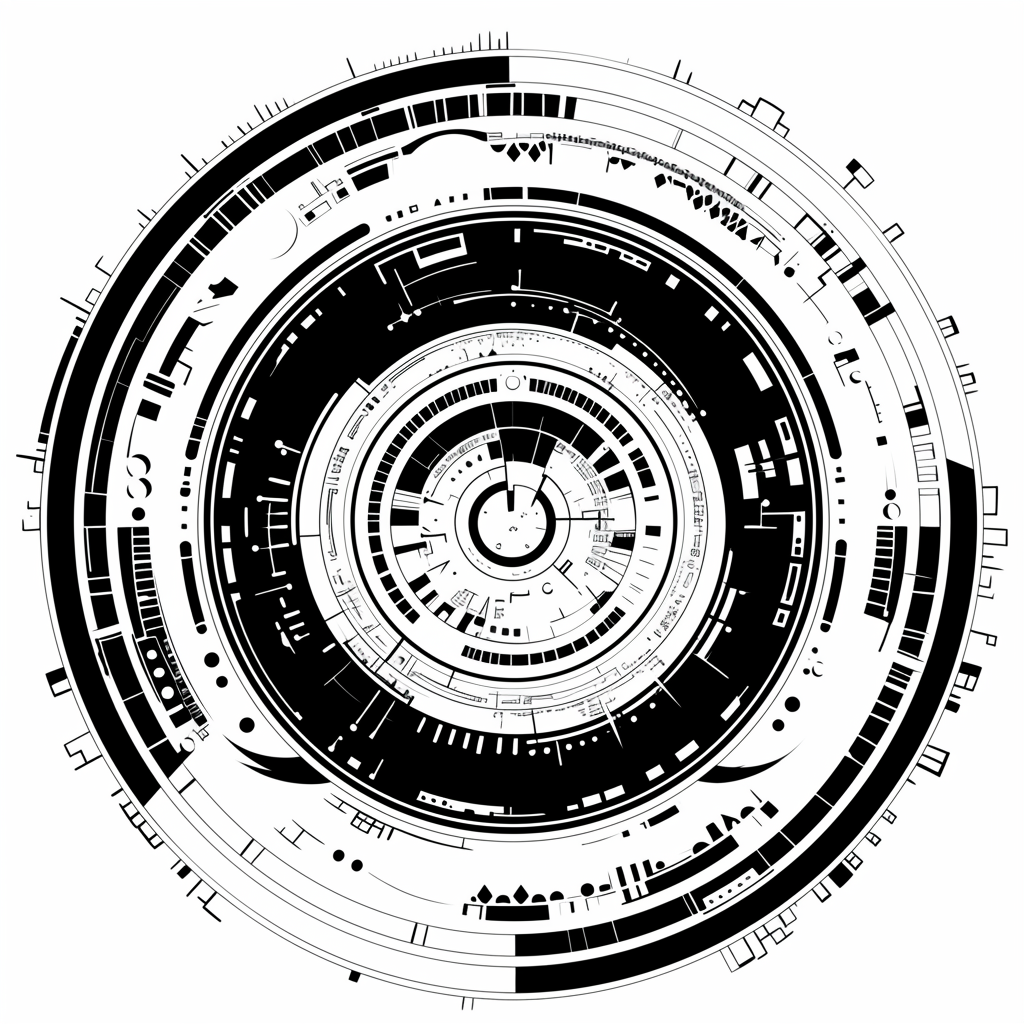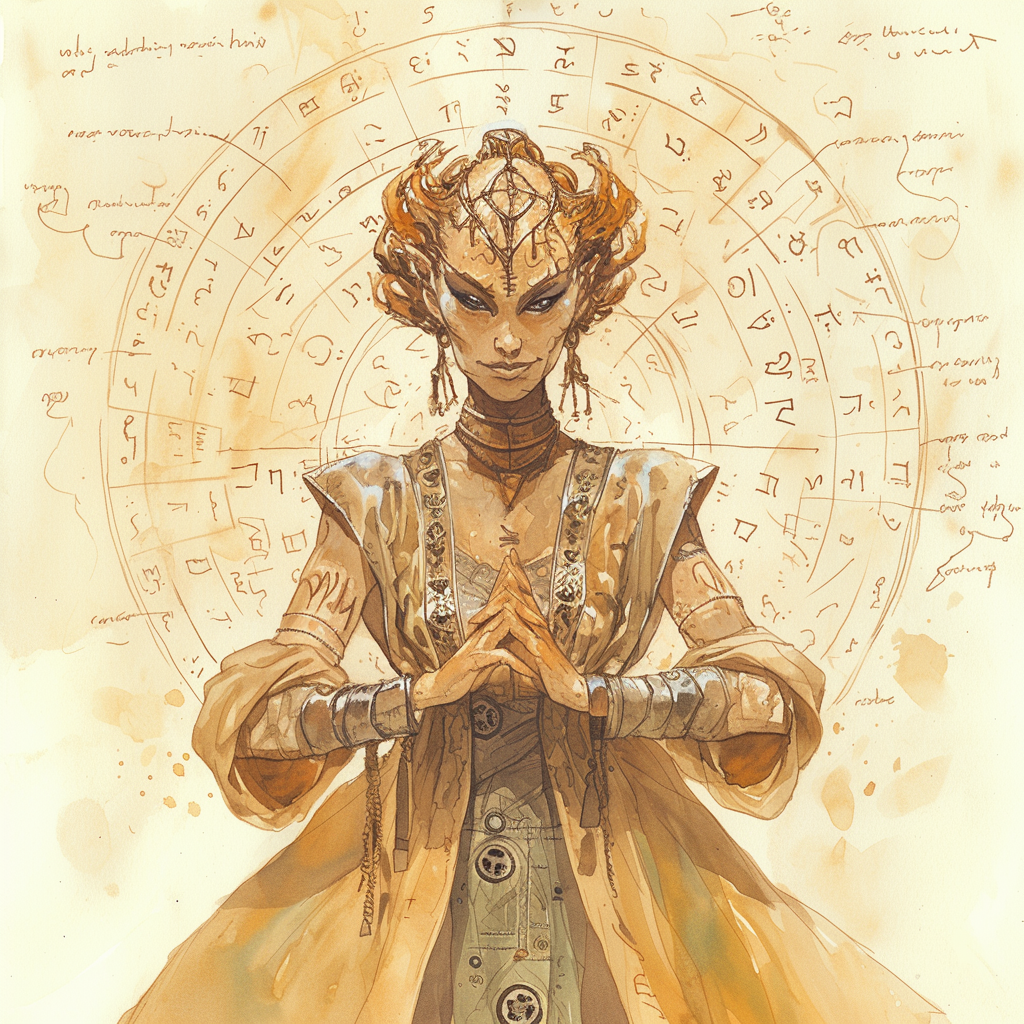The Mathematicians
Also known as: The Beancounters
Mathematics is like love; a simple idea, but it gets complicated

“Congratulations! You scored a 72 on the Mathematician Entrance Examination, which means that you have passed the test! You are now considered a ‘Thousandth Place’ Mathematician; what a layperson would refer to as a ‘student’, and therefore we confer to you all the respect and responsibility worthy of someone in your station.
“We know that the Examination Period is a difficult time, but now that you have passed the test you are worthy of the knowledge and information our sect has learned through centuries of hard work. Being a Mathematician is not just about doing advanced mathematics and science all the time, accomplishing nothing. Far from it. A Mathematician is responsible for unlocking the workings of the Multiverse, of delving into the most complicated problems headfirst and calculating until said problems are solved. That is what we Mathematicians do: we are responsible for solving The Problem—the most complex mathematical formula in the Multiverse.
The Problem is so complicated and advanced that even our sect, which is comprised of the greatest mathematical minds from across the Planes, has not even finished making the formula for it yet! Once The Problem has been solved, however, we will have the absolute algorithm to the Multiverse—the formula, by which, the entire Multiverse operates!
“Consider yourself blessed to know that you are among the few selected to join our esteemed ranks. Orientation for all of those who passed will occur tomorrow afternoon, at 1 A.P., in the Inductees Hall, in the town of Radian. Enclosed in this message are directions to aforementioned Hall and town.”
—An acceptance letter from the Mathematicians.
Sect History: The Mathematicians are relatively young, as far as sects go. About three-hundred years ago there lived Guvner by the name of Rikard the Logical. Rikard loved law and order just as much as the next Guvner, but he had a different spin on the whole “structured multiverse” theory. While his comrades were out attempting to understand the laws of the multiverse, Rikard was contemplating the mathematics of it all. He would sit in his office for hours, days even, working out the most complex mathematical formulas that Guvners had ever seen. When asked what he was trying to solve, he would reply, “The Multiverse, of course!”
It wasn’t until later in Rikard’s life that he realized the Fraternity of Order wasn’t exactly what he had in mind. Sure, he agreed with a lot of what they taught—that the multiverse is based upon laws, and that everything follows those laws. But when it came down to the very essence of the Fraternity’s tenets, Rikard just had to disagree. “The Multiverse is not run by just laws,” he argued, “It’s run by mathematical laws!” Rikard believed that if someone could figure out the formula that the multiverse operates by, then that someone could theoretically control the multiverse. In a stirring speech before the assembled Guvners, Rikard explained his thesis, which was met by overwhelming enthusiasm by some, and mild acceptance by others. After his lecture, Rikard announced he was quitting the Guvners, and that he would be moving to Mechanus, where he would spend the rest of his life working out the formula that ran the multiverse. Much to his surprise, a group of like-minded Guvner’s followed him there.
The newly-formed group arrived first in a large city called Circumference, where Rikard settled down. Slowly but surely, his followers spread out throughout Mechanus, travelling from layer to layer, city to city, gear to gear. They would maintain contact with each other through letters, explaining different formulas they were working on, requesting on certain research projects, and sharing recent discoveries. These individuals would also scout out the local population, looking for potential apprentices and recruits. Thus, the Mathematicians were born.
3.1415926535897932384626433832795028841971693
—A new recruit’s answer to Question 109 on the Sect
99375105820974944592307816406286208998628034
82534211706798214808651328230664709384460955
0582231725359408128…
Entrance Exam: “Carry ‘pi’ out to as many decimal
places as you can without using a quill, ink or paper”
Near the end of Rikard’s life, he decided that the Mathematicians should have a base of operations, a set, specific location that all Mathematicians could go to study, or exchange ideas and information without having to wait for weeks and weeks for a letter to arrive. He called together his original followers, who were the greatest minds of the Mathematicians at the time, and this think-tank of mathematical genius went to work on finding the perfect location for the Mathematician’s headquarters. Nine months later, Rikard sent messages to all Mathematicians everywhere, declaring that they had devised the absolute perfect location for the Mathematician base. The letter included directions on how to get there, and orders to leave as soon as possible for the location given in the directions.
A short time later, all the Mathematicians, who were originally scattered across the Multiverse, were standing on a rather large cog. Off in the distance, the group (numbering about a hundred) could see the outline of a town or village, and in that direction the group went. After a long walk, they all arrived at the edge of a small town. Awaiting them at the edge of the town was none other then Rikard himself. The great man announced that they now stood in the very centre of Mechanus, and that this is where they would make their sanctuary. Rikard had discussed the situation with the town leaders, and after some negotiation, the town had agreed to let the Mathematicians move in.
Rikard died shortly after this, but as per his wishes, the town (which was renamed Radian) was overhauled. Walls were erected, buildings demolished, and the entire town was rebuilt into perfect, geometric symmetry. Now with a home to collect all their data and information in, the Mathematicians set about to their purpose — solving The Problem.
The half life of one of our theories is about three weeks!
—(Only?) joke told by members of the Mathematicians sect

The Sectol: Sectols in the Mathematicians are not called “Sectols”. They are referred to as the “Prime Digit”, or often just the “Digit”. The Digit of the Mathematicians is determined by the previous Digit. Thus, before Rikard died, he chose one of his most intelligent pupils to take his place, and then that one chose his favourite, and so on. The current Prime Digit of the Mathematicians is Laretua Quinton (planar human diviner [she/her] / Prime Digit of the Mathematicians / LN). Laretuous has been the Digit for about eight years now, and she’s the youngest sectol to date, aged only thirty-one years.
Laretua may be young for a Digit, but she’s one of the smartest Mathematicians ever. Within her first two years she had already advanced the sect’s knowledge of The Problem by leaps in bounds, and under her guidance, the Mathematicians believe they may finally be able to determine what The Problem is, and set about solving it.
Sect Headquarters: Mechanus, of course. Where else would a bunch of mathematical geniuses hang out?
The actual sect headquarters is located on a large gear which, by Mathematician calculations, is located in the dead centre of the plane. In the middle of this gear sits a medium-sized burg called Radian, the population of which is a perfect 15,000. The last Mathematician census showed that a majority of the town (85%, 12,750) was human. An additional 5% (750) is demihuman. The remaining 10% (1,500) is a brigade of modrons who are stationed on the same gear that Radian is built upon. No one is really sure how Radian maintains its population of 15,000, or why it stays 15,000. But whenever someone new moves in, someone either “coincidentally” moves out (“I’ve been lookin’ to move for a while now…”), dies (heart-attack, old age, etc.), or simply vanishes in some cases. No one knows who is responsible for this, but the Mathematicians deny all knowledge of the occurrences, and the modrons don’t even acknowledge the subject.
Radian’s government is a model of efficiency, putting any Guvner-run town to shame. Everything occurs on the exact second that it is supposed to, and the massive water-clock in the centre of town dictates the time of day to all. Since the Mathematicians are generally not a very physically-inclined bunch of bloods they’ll often hire out groups of adventurers and mercenaries to guard the town for them.
Across the street from the water-clock is the Mathematician’s most prized building: the Library of Numbers. This gargantuan building of stone and iron houses all of the Mathematicians research. Everything every Mathematician has discovered, devised, calculated, formulated and thought up is written down and stored in the Library, which is guarded by the most expensive mercenaries money can buy, as well as potent magical traps.
Role-playing the Mathematicians: It’s natural to assume that playing a Mathematician isn’t all that fun. Unless, of course, you really, really, really like maths. But in actuality, playing a Mathematician could be an enjoyable experience. Not all Mathematicians hide in their houses and do math problems all day long. Some of them go out and explore the Planes, collecting data that they can use to solve The Problem. To this end, some Mathematicians might tag along with adventuring parties, offering their information and brainpower in return for muscle and protection. Most Mathematicians are wizards of some sort, so they can also use their magical powers to help the group they ally themselves with. When playing a Mathematician remember that you are primarily concerned with, well, maths. Everything you do is logical to the extreme, and you never let emotion override rational thought.
Membership: You have to be really smart. Brilliant, even. Canny doesn’t even begin to describe your average Mathematician member. First, a potential Mathematician has to apply for membership, whereupon they are evaluated for one month by the local Tenth Digit (see below). If the Tenth deems the cutter worthy, then the potential Mathematician must take a test which lasts (generally) a week. During the test, the inductee gets half-hour breaks at 6 B.P., Noon, and 6 A.P., as well as a five hour rest period to sleep. All other time is spent doing the test, called the Mathematician Entrance Examination. As a game rule, anyone with an Intelligence below 17 will likely fail the test. When the test is complete, it is graded by the local Tenth, and if the inductee gets a 70 or higher, they are officially added to the sect.
Structure: The Mathematicians’ organisation is similar to most factions or sects, with a few slight modifications. The Mathematician structure is set up like a pyramid. At the very bottom are the namers of the sect, which are referred to as Thousandth Digits, or just Thousandth. Above the Thousandth there are the factotums, called Hundredth Digits. Each Hundredth is responsible for ten Thousandth, who must send monthly reports to their Hundredth detailing their activities and discoveries they’ve made. Above the Hundredth Digits are the factors, dubbed Tenth Digits. There are only five Tenth Digits at any one time in the Mathematicians, and any blood brilliant enough to make it that high stays there for life. Finally, above all these is the sector, called the Prime Digit.
I must be mad! What you’re saying is starting to make sense!
—Thul the Bleaker to a Mathematician
Allies & Enemies: The Mathematicians get along very well with the Fraternity of Order, their parent faction. The two groups constantly exchange information and ideas, and both have been known to recommend potential recruits to the other.
The other Lawful factions, such as the Harmonium and Mercykillers, generally get along with the Mathematicians. The two groups will usually ignore one another, but when the two meet, it’s often on friendly terms.
There are certain factions, however, that loathe the Mathematicians—and the Mathematicians loathe them. The Hands of Havoc don’t get along with the Mathematicians very well at all, and there’s nothing the Mathematicians would like to see more than the destruction of these anarchists. The Doomguard and the Free League dislike the Mathematicians, and the feeling is mutual. The Mathematicians feel that the Doomguard is a bunch of nihilistic weirdoes bent on destroying the Multiverse. The Free League annoys the Mathematicians with its very existence—a ragtag bunch of berks that follow no common principles or pattern.
Advantages and Disadvantages: Well, just being a Mathematician means that you’re one of the smartest bloods around. Plus, if you have an Intelligence of 17, you’re probably a spellslinger, which means you get all kinds of neat bonuses.
Another advantage to being a Mathematician is only useful on Mechanus, and that is a Mathematician can navigate their way through the Labyrinthine Portal in 1d3 rounds just by doing some basic calculations for 1d3 turns. Not terribly useful elsewhere, but on Mechanus, you can’t find a way to get around faster.
The only disadvantage to being a Mathematician is that you must share your findings with your brethren, and you can’t tell outsiders about what the Mathematicians are doing. Ha! Like outsiders would even understand, anyway.
Current Chant: Chant has it that the Mathematicians are just one decimal place or raised dot away from finishing The Problem—which means they can then start solving it. Sure, it may take them another three hundred years to do so, but if the chant’s to be believed, they’re a lot closer then the rest of the factions to calculating the secrets of the Multiverse.
Canonical Sources: Factol’s Manifesto [2e] p77; Planes of Law [2e] Mechanus p5,12; Uncaged [2e] p123. Canonwatch: The Mathematicians were first introduced in Planes of Law: Mechanus. This entry expands upon that lore.
Source: Brant Casavant


